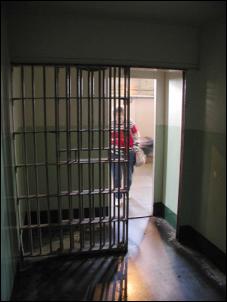Justice Paterson For The Next Security And Intelligence Inspector-General?
As of Friday 16 July, a High Court decision (click for full text) from Justice Paterson means that anyone subject to a Security Risk Certificate will be detained indefinitely, without bail and without recourse to Habeas Corpus. Whilst there was a possibility of discretion regarding where a Security Risk Certificate recipient could be held - Justice Paterson considered there was substance in the Crown’s submission that this other place of detention would:
“Have to be as secure or more secure than a penal institution.”
Exactly what sort of detention facilities would be needed to contain a risk to national security wasn’t ventured by Justice Paterson. Also further confusing the matter was the fact that Justice Paterson considered the Department of Corrections could somehow increase security at an institution managed by the New Zealand Immigration Service.
"…if the Department of Corrections was prepared to increase the security at the Mangere Centre, a transfer [of Mr Zaoui from Auckland Central Remand Prison] could be effected by agreement."
Thus given the current Labour Government’s indifference to criticism by the United Nations, Amnesty International and any number of human rights organisations, Ahmed Zaoui, New Zealand’s only Security Risk Certificate recipient looks to be destined for a term of indefinite penal detention.
Ex-Diplomat’s New Power To Incarcerate

Image: Director of SIS Richard Woods
What is rather more worrying is that after Justice Paterson’s decision of 16 July 2004 it is not just democratically elected Members of Parliament of foreign states that could end up rotting in New Zealand jails.
For an ex-diplomat with no known legal expertise, current Security Intelligence service Director, Richard Woods now occupies a rarefied position in New Zealand society. What Justice Paterson’s decision states in effect is that with the current Minister of Immigration, Paul Swain’s concurrence, Mr Woods with the stroke of a pen can send anyone resident in New Zealand that has not yet achieved citizenship
- Into a term of indefinite mandatory detention (at present presumably still within a prison till special high security immigration detention centres are constructed);
- there will be no possibility of bail;
- the possibility of Habeas Corpus also appears illusory.
Mandatory detention to protect New Zealand’s economic wellbeing?
As if this wasn’t enough - the reason behind this mandatory detention may not necessarily relate to any act of planned violence the Security Risk Certificate recipient may be about to inflict upon New Zealand.
The Security Risk Certificate recipient could just be considered by Mr Woods as capable of diplomatically embarrassing New Zealand or of somehow affecting New Zealand’s economic interests. The reason behind this is that the definition incorporated into the Immigration Amendment Act 1999, of security, is the re-jigged definition from the 1996 New Zealand Security Intelligence and Security Act.
And should a Security Risk Certificate recipient indeed be a danger to New Zealand’s economic well being Mr Woods is the perfect man to ferret them out. As Woods stated to a Cathie Bell of the Dominion in 1999 on becoming the head of the SIS.
“I had always thought the SIS had a very important role. Its traditional role of protecting New Zealand from espionage and sabotage and terrorism is obviously important. But it has been extended to include making a contribution to New Zealand’s international and economic well-being. I have spent a fair bit of my career concerned with that second area. I thought my experience might be relevant, and that’s what has been decided.”
One of the most bizarre aspects of Justice Paterson’s decision is that a potentially non-violent risk to say, for instance, New Zealand’s lamb exports to Tunisia could end up spending years behind bars with no charges as such levelled against them, whereas an actual suspected terrorist is able to apply for release on bail with conditions. Justice Paterson explains this anomaly by pointing out that; if there is no specific provision to apply for release in the Act then ipso facto there can be no release.
“The fact that a person who may be a suspected terrorist has a right to apply for release on conditions under part III (of the Act) does not alter this view. Part III covers a wide variety of people many of whom would be eligible for a release on conditions. A suspected terrorist would have to satisfy a District Court Judge that his or her release would not be contrary to the public interest before that person could obtain a release on conditions.”
Bill of Rights Considerations

Ahmed Zaoui: "I am a human being. I am not an animal; I am a professor."
The average punter on the street may have thought before last Friday that spending a couple of years in jail including ten months in solitary confinement without charge may have been ‘a disproportionately severe treatment or punishment’. Indeed this treatment has been condemned by Amnesty International and a hard hitting United Nations report.
Fortunately for the current Labour-Progressive Government however Justice Paterson considered spending a couple of years of ones life in jail isn’t actually too bad. The judgment did however express some mystification at why Mr Zaoui was put in solitary confinement for 10 months at Paremeremo
“Although termed 'non-voluntary segregation' by the Department of Corrections, Mr Zaoui was, in effect, held under conditions akin to solitary confinement. He found this experience a devastating one. On the information by Mr Zaoui, it is difficult to understand why the severe and onerous conditions were imposed on him.”
Indeed to many fair minded New Zealanders this treatment was indeed difficult to understand. Especially as there were also complaints of Mr Zaoui being assaulted by officers whilst in Paremoremo Prison's infamous D Block.
The Corrections Ministers responsible over the course of Mr Zaoui’s detention have been fairly reticent about their role in Mr Zaoui’s incarceration. Paul Swain is now responsible for Mr Zaoui’s care, however both Mark Gosche and Margaret Wilson have filled the role of Minister of Corrections during Mr Zaoui’s New Zealand prison sojourn. Indeed the allegations of brutality by prison guards in D –Block to Mr Zaoui and the following investigations that resulted occurred, mostly, during current Attorney-General Margaret Wilson’s stint in the hot seat.
19 months in prison for Mr Zaoui is according to Justice Paterson, ‘unfortunate’ in his learned opinion but, ‘not enough to outrage the standards of decency’ as referred to in a mid 90s deportation case (not actually involving mandatory indefinite detention). Justice Paterson was also supplied with a great variety of overseas cases by the Human Rights Commission. These examples of international jurisprudence too failed to sway Justice Paterson.
“On the basis of international cases, I am not satisfied that Mr Zaoui’s present detention is inhumane,” he declared.
Habeas Corpus

King John – who signed the Magna Carta promising not to lock up his barons without charge.
The ancient English common law writ of Habeas Corpus was also met with short shrift by Justice Paterson. His reasoning seemed to be because Mr Zaoui is the recipient of a Security Risk Certificate and because Justice Paterson considers a person with a Security Risk Certificate must be mandatorily detained throughout the process with no chance of bail, then it logically follows that they also can’t be released under Habeas Corpus.
Whilst this reasoning seemed perfectly logical given the rest of Justice Paterson’s reasoning, it fails to explain why Habeas Corpus was included in the legislation in the first place.
“Part IVA provides for continued detention until the process in it has been determined. That the process has taken longer than contemplated by the legislation is not in my view, a ground to issue a writ for Habeas Corpus”
The Legislative intent

Former Minister of Immigration Lianne Dalziel – on the Select Committee that considered the legislation, and latterly the Minister responsible for immigration during the early stages of Zaoui's incarceration.
Due to the fact that Hon Tuariki Delamere, abdicated his responsibility as Minister of Immigration in 1999 and declined to explain how Part IVA would work in practice, much of Justice Paterson’s decisions rely on his interpretation of what the legislative intent of the Act may have been. Because bail is not mentioned in the Act Justice Paterson says:
“I am satisfied that the legislative intent was that a person detained under part IVA has no right to apply for release on conditions.”
Sadly many of the people that would have known what the legislative intention was have decided to keep very quiet.
During the Immigration Amendment Act’s final readings in March 1999 advocates for the dispossessed such as Lianne Dalziel, Mark Gosche, Taito Philip Field and Tim Barnett pointed to the dangers of introducing such legislation. Thankfully for New Zealand’s international well being and economic interests, such liberal hand wringing has now been well and truly forgotten by the Labour Party.
If there was any desire whatsoever from the Labour- Progressive Government to advance it’s publicly stated aim of making New Zealand a world leader in Human Rights then at least one part of Justice Paterson’s decision allows them that leeway.
In direct contradiction to the Prime Minister’s public assertion’s that the Government’s hands are tied on the incarceration issue, Justice Paterson has pointed out what has been blatantly obvious to anyone reading the relevant legislation – detention in a penal institution is not the only option for the Executive.
However, given Paul Swain’s recent assurances to National’s Dr Wayne Mapp, regarding Mr Zaoui’s incarceration, it is fairly certain that Keith Locke and Matt Robson will be visiting the ‘parliamentarian in prison’ at Auckland Central Remand prison for the foreseeable future.



 Richard S. Ehrlich: Deadly Border Feud Between Thailand & Cambodia
Richard S. Ehrlich: Deadly Border Feud Between Thailand & Cambodia Gordon Campbell: On Free Speech And Anti-Semitism
Gordon Campbell: On Free Speech And Anti-Semitism Ian Powell: The Disgrace Of The Hospice Care Funding Scandal
Ian Powell: The Disgrace Of The Hospice Care Funding Scandal Binoy Kampmark: Catching Israel Out - Gaza And The Madleen “Selfie” Protest
Binoy Kampmark: Catching Israel Out - Gaza And The Madleen “Selfie” Protest Ramzy Baroud: Gaza's 'Humanitarian' Façade - A Deceptive Ploy Unravels
Ramzy Baroud: Gaza's 'Humanitarian' Façade - A Deceptive Ploy Unravels Keith Rankin: Remembering New Zealand's Missing Tragedy
Keith Rankin: Remembering New Zealand's Missing Tragedy